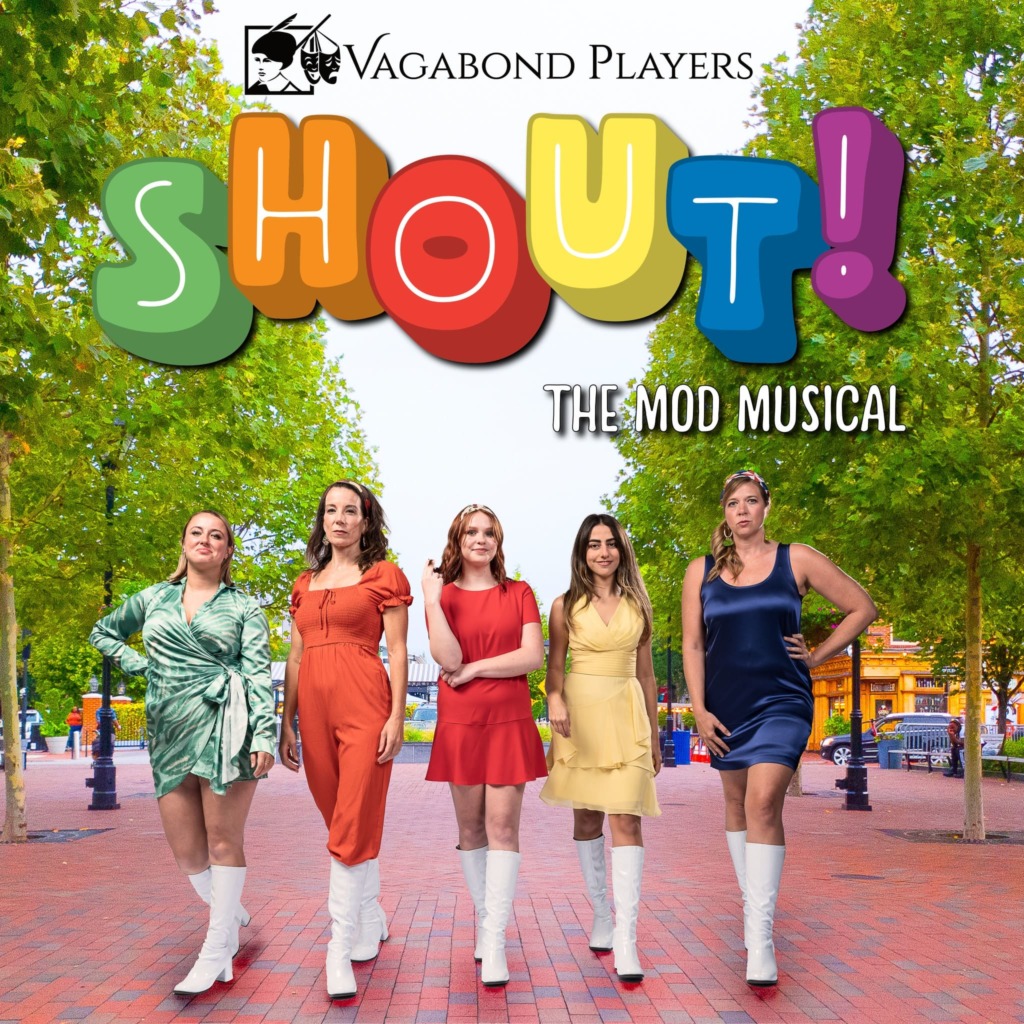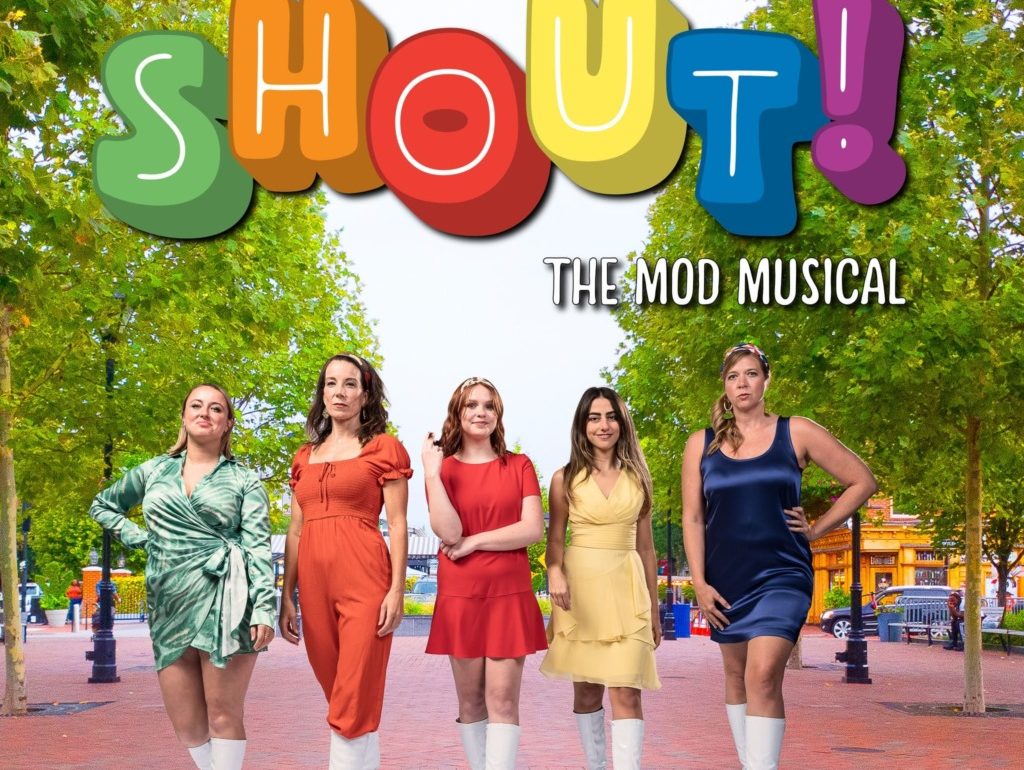Are you ready to color your world with sunshine yellow today? Color your world with musical theatre happiness all the way? Just take the green from the grass and the blue from the sky up above and you can color your world just paint it with their love! Who’s love? SHOUT! The Mod Musical and their colorful singing quintet, that’s who. The quirky 60’s musical (jukebox variety style) SHOUT! The Mod Musical has made its way to The Vagabond Players in Fells Point as the opening musical (and second total show) in their 107th season. Created by Phillip George, David Lowenstein, & Peter Charles, the show is set in the swinging 60’s and features a bunch of British pop hits from that musical timeframe. Directed by Lou Otero with Musical Direction by LeVar Betts and Choreography by Katie Noppinger, this upbeat musical outing is just-under two hours of fun and fancy free.

Don’t break your brains with this one, folks, it’s a somewhat dated piece of theatre whose references haven’t aged particularly well, but the music is somewhat timeless and the performances are quite strong. Co-creators Phillip George, David Lowenstein, & Peter Charles Morris pull together iconic numbers like “Coldfinger”, “Son of a Preacher Man”, “These Boots Are Made for Walking”, and others, stab them in the center of ‘livable London’ (a joke for anyone who actually knows central London), and loosely threads them together with micro-vignettes of text that are mostly nonquitters. The humor is dated (to the time period) and the responses from the “advice columnist” are cringeworthy at best. But try not to let this phase you because the singing and dancing from the five performers— along with their totally ‘mod’ costumes are well worth enjoying.
Set Designer Sammy Jungwirth keeps the aesthetic simple. It’s meant to be ‘life in London’ so you get five doors to townhouses or flats, each one color-coordinated to each of the women. (They are literally referred to as Blue Girl, Orange Girl, Green Girl, Red Girl, and Yellow Girl.) The doors have half-top barn-style swinging openings so that some of the zippier one-liners can be delivered from them, as if leaning out a window gossiping to the next-door neighbor. Lighting Designer Michael Lentz does a fine job of infusing various moments (particularly when different girls are singing different color-coordinated songs) of matching the colored light infusions to the mood or the song reference. There’s no credited costumer in the program but the costumes are pretty spot on for both the ‘mod’ phase of the 60’s (and later early 70’s as the show transitions all the way up to 1970.) The white vinyl go-go boots, particularly as they are all donned for “These Boots Are Made For Walking” is an extra impressive touch.
LeVar Betts and his hidden live orchestra (Betts on keys1, Winston Phillips on keys2, and Virgil Boysaw III on percussion) keep the tempos driving and ease the speed and pacing when the numbers are slower and possess more of a melancholy tone and somber feel. Choreographer Katie Noppinger infuses a lot of shuffles, step-to’s, and other 60’s-esque dance moves to the various routines that populate the production. The stage is intimate and cozy but with just five performers, Noppinger finds a way to craft a dancing illusion of both space and togetherness, so that they appear to be taking up more stage than there is to utilize without seeming overcrowded.
Director Lou Otero has done a solid job of getting five talented singers onto the stage and made a couple of choices that really elevate the production out of its milquetoast existence. The character of ‘Gwendolyn Holmes’ (the ‘Dear Abby/Advice Columnist character) is scripted to be a voiceover. Otero chooses to set the actress up live on stage in a slide-in desk fashion, which not only gives Rachael Wooden (who plays the character and is also the understudy for the colorful character girls) some on-stage time but also allows the audience to see the visual disparity between her high-flatulent nature, done up in fur hat and fancy clothes, and the average ‘mod girl’ who is writing in for advice. Otero’s other delightful elevation in this production is using the voiceover work of local area superstar Stephen M. Deininger as the ‘radio adverts/announcer’ character (which is scripted as a voiceover.) Deininger’s playful nature is well-suited for these time-worn ads, lending a comical air to them with great enthusiasm and a keen understanding of the era’s patois and cadence.
The show itself doesn’t allow the women much agency over their experiences (there are some pretty brutal instances— including one of the “ask-advice” segments where one of the girls confesses to being beaten by her husband and the advice columnist basically tells her it’s her fault she gets beaten and to try a new hairdo— spritzed throughout the performance) but Otero encourages the girls to find little moments of silent connection, either with themselves, with the audience, or with each other to give them more of a powerful footing in how their story is told. It helps to keep the dated humor and otherwise awkward and outmoded bits of the script from dragging the overall energy down into the floorboards. The solo numbers where just one girl is featured in song has Otero staging the specified character alone on stage (the script seems to call for the others to remain on stage singing backup and while the others do sing backup in this production, they do it from behind the scenes) and these really highlights some of those more critical ‘character’ moments, giving the audience a chance to see these girls and their individual traits.
Emily Decker, Vanessa Eskridge, Calla Fuqua, Ali Leary, Ege Yalcinbas, or in this show better known as Blue Girl, Orange Girl, Green Girl, Red Girl, and Yellow Girl, are the singing sensations that Otero has amassed and put onto the stage. What’s truly brilliant about their performance is their ability to blend vocally, support one another in group numbers with strong backup harmonies and sing in the style of the 60’s numbers that are featured. Anyone with talent and coaching can sing. But not everyone can sing to the style of the song from that particular era. And these five fantastic women master the sound of the 60’s, particularly when doing big splashy group numbers like “Wishin’ and Hopin’” or the “Shout!” While the British accents across the board* are a bit of a stretch (and sound to your average theatregoer like something vaguely English) you’ll forgive their speaking voices because of all the heart, soul, talent and emotion they bring to their songs. (*Ege Yalcinbas’ character is actually the American, so she doesn’t put-on a British accent.)
Blue and Orange (Decker and Eskridge, respectively) crossover a couple of songs near the show’s conclusion— “You’re My World” and “All I See Is You” and both get more sobering solos early in the piece as well, with Decker doing “Don’t Sleep in the Subway” and Eskridge performing “Wives and Lovers (My Handsome Prince.)” Both have simple and solid voices that service these songs well. Decker’s character is the potentially closeted lesbian character while Eskridge, whose character’s marriage appears to be failing, turns out to be the more maternal figure who comforts the aforementioned victim of spousal abuse. Both have strikingly powerful confession moments towards the end of the production where the script sort of plays a “who’s who and where they are now” round-robin sort of moment so that the audience can see where the ladies might start off in the 70’s.
Red (Leary) is the adorable, awkward, and completely nervous little virginal archetype. She’s meant to be portrayed as the youngest of the girls and her voice is dulcet and winsome, much like the way she comports herself on stage. But her facial expressions are hysterical, especially when she’s telling some of her story bits. “To Sir With Love” becomes this simping number where you can hear the depths of Leary’s character’s adolescent heart just pining away over some guy she has yet to meet. Leary has an ingenue quality to both her character portrayal and her general solo sound, which is well-suited for this particular role.
Sassy, brassy, and labeled by the script as slutty, Green (Fuqua) has some of the funniest asides when it comes to talking her way through the micro vignettes featured in the script. She does a whole bit all about how to break up with a bloke— concluding on the very flippant note that “…if he’s American, just get fat; he’ll break up with you.” Her accent is the most convincing of the bunch who are portraying British, it’s gritty and working class. And when she sings, she is unabashedly afraid to belt and put a sturdy sound out there. This really does wonders for “Coldfinger” (The Bond Film number) where Fuqua gives Shirley Bassey a run for her money (and good gracious do the other four have fun doing the background sounds of that song as vocal scats.) Fuqua knows how to carry her character’s charisma, balance it with snappy humor, and she’s got incredible pipes.
Ege Yalcinbas is parading her character’s sunshine yellow all over the place. She takes vocal point on several of the group numbers like “These Boots Were Made For Walking” and “Shout!” as well as her solo numbers like “Son of a Preacher Man.” Brash and brassy though in a nature different from that of Fuqua’s Green Girl, Yalcinbas has a powerhouse voice that she’s unafraid to put out there. Her character is also stalking Paul McCartney (who you never see) and her mournful “I Just Don’t Know What to Do with Myself” solo becomes sort of this tongue-in-cheek hilarity because rather than deliver the number with mountains of woe, she idles away through the song, knowing that her character is singing it to the lose of Paul McCartney as a single man. Tying the company together like foreign glue, Yalcinbas keeps the energy pumping during some of the more energetic numbers, like “Those Were the Days.”
You gotta come along right now and go downtown— to Fells Point and catch The Vagabond Players production of SHOUT! The Mod Musical this fall. It’s a plucky little pick-me-up amid all the Halloween horrors and fall gloomies that hang about this time of year.
Running Time: Approximately 1 hour and 45 minutes with no intermission
SHOUT! The Mod Musical plays through November 20, 2022 at Vagabond Players— located in the heart of Fells Point: 806 S. Broadway in Baltimore, MD. For more information on tickets, seating and Covid policies, please call the box office at (410) 563-9135. Tickets are available for purchase in advance online.

